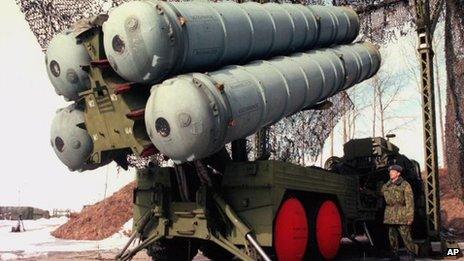Russian arms 'to deter foreign intervention in Syria'
- Published
- comments

As well as targeting aircraft, the S-300 can engage ballistic missiles
Russia says it will go ahead with deliveries of S-300 anti-aircraft missiles to Syria, and that the arms will help deter foreign intervention.
Deputy Foreign Minister Sergei Ryabkov said the missiles were a "stabilising factor" that could dissuade "some hotheads" from entering the conflict.
Russia also criticised an EU decision not to renew an arms embargo on Syria.
The decision came as the BBC heard evidence that 200 people were killed in a massacre in western Syria this month.
More than 80,000 people have been killed and 1.5 million have fled Syria since the uprising against Syrian President Bashar al-Assad began in 2011, according to UN estimates.
'No deadline'
On Monday, the EU said member states would be able to decide their own policy on sending arms to Syria, after foreign ministers were unable to reach the unanimous decision required to extend the current arms embargo past Saturday.
However, in a declaration announced after 12 hours of talks, external, it agreed not to "proceed at this stage with the delivery" of equipment.
The EU's Foreign Affairs Council is to review this position before 1 August, in light of fresh developments to end the conflict including the ongoing US-Russia peace initiative.
Speaking to the BBC, UK Foreign Secretary William Hague said the 1 August date did not represent a deadline, and that the UK could start arming Syrian rebels from now, although it had no active plans to do so.
A US state department spokesman said the US supported the EU's move.
The Syrian foreign ministry said the decision showed the EU's "obstruction of international efforts to contribute to the achievement of a political settlement".
Russia says the move directly harms the prospects of an international peace conference proposed by Moscow and Washington that would be held next month.
"A whole range of actions that have been undertaken, not without the participation and not without the support of our Western partners including the United States and France... are serving to undermine the idea of calling a conference," Russian media quoted Foreign Minister Sergei Lavrov as saying on Tuesday.
Russia has repeatedly blocked efforts to put more pressure on Mr Assad. Along with the US, Moscow has been leading efforts to organise an international peace conference on Syria next month.
Mr Ryabkov said the contract for the S-300 missile systems had been signed several years ago.
"We consider these supplies a stabilising factor and believe such steps will deter some hotheads from considering scenarios that would turn the conflict international with the involvement of outside forces," he was quoted as telling journalists, in a coded reference to the use of Nato warplanes in Libya.
The S-300 is a highly capable surface-to-air missile system that, as well as targeting aircraft, also has the capacity to engage ballistic missiles.
It is broadly comparable to the US Patriot system which has been deployed by Nato to guard Turkish air space against attack from Syria.
Israel's warning
There had previously been a reluctance to mention the sophisticated weapons system by name, and the BBC's Jim Muir in Beirut says the latest Russian statements could be seen as an escalation.
Indeed, some analysts see confirmation of the arms sale as a "game changer" for the Syrian crisis.
"It virtually ensures that the US-Russian talks will be meaningless, sends warning signals about similar arms transfer to Iran, can drag Israel into the Syrian fighting, and would sharply alter US and allied 'no fly' capabilities," said Anthony Cordesman of the Centre for Strategic and International Studies.
There had been reports that Moscow was holding back on delivering the arms, in exchange for an Israeli commitment not to carry out further air raids over Syria, our correspondent says.
Israeli Defence Minister Moshe Yaalon said the Russian missile systems had not yet left Russia.
"I hope they will not leave, and if, God forbid, they reach Syria, we will know what to do," he said.
The EU embargo, first imposed in May 2011, applies to the rebels as much as the Syrian government.
Britain and France had been pressing for the ability to send weapons to what they call moderate opponents of President Assad, saying it would push Damascus towards a political solution to the two-year conflict.
Unverified footage, apparently filmed by pro-government fighters, shows houses and cars on fire
Other EU states had opposed sending arms.
George Jabboure Netto, a spokesman for the opposition Syrian National Council said the dropping of the arms embargo was a "step in the right direction", though a spokesman for another grouping, the Syrian National Coalition, said the move might be "too little too late".
The Syrian opposition has not said whether it will attend next month's peace conference, and was on Tuesday locked in talks in Istanbul, Turkey, as an unofficial deadline to decide on its attendance passed.